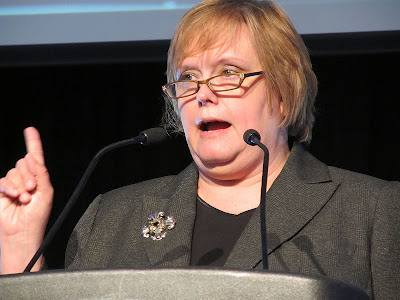 Photo by Chelsea Crawford
Photo by Chelsea CrawfordBy Sarah Tomkinson
Two politicians came out to show support for their respective parties.
Deb Detmers, the District Director of U.S. Rep. John Shimkus (R-Centralia), gave a speech as to why she is Republican, and Democrat Representative Mike Boland (D-Moline) applauded the Democratic Party.
Both gave examples of their respective parties dealing with hard times and overcoming them.
Detmers, pictured above, expressed that Americans as individuals should do something, and Boland expressed the changes that have happened under Democratic presidents.
Which one was more effective, is highly dependent on audience and whether they found changes proposed and passes by Democrats to be good, of course. Not everyone is crazy about Obamacare, and some people believe that Camp David didn’t actually fulfill everything it was chalked up to be. To say that we are thankful as society for everything Democrats did is like saying the entire world celebrates Christmas. There are many exceptions.
Detmers took a different approach. She expressed everything that she felt needed to be changed. The Congressional aide said that everyone should help.
“Do something,” she said, remembering her own experience working on campaigns. “Be an envelope stuffer.”
To her, Americans should not be so reliant on others.
Side by side, the two speeches were yin and yang. Boland spoke of hope that we as a society were on the right path by sticking with Democrats in office. He emphasize looking at everything that’s been accomplished, at all the great things we have now.
Boland’s address was one of hope -- one that easily represented something observers would find in President Obama’s campaign.
In contrast, Detmers expressed the terrible situation the nation is in. She asserted that the country is in a similar state as when Jimmy Carter was president – and that a Republican change is what society needs. Just like President Reagan, any new Commander in Chief Who’s a Republican would be better than the one we have now, she said.
She added that the United States is in dire straits, and that Illinois is seen as the grease by the lake. To her, we need to help better ourselves and not wait for the government to help us.
Of course, many people don’t look at Illinois as a pile of grease, and many people believe that the government is us, and is a way we help each other.
Depending on which person you agree with depends on your political philosophies. Both speakers were obviously passionate about their own stances, and both see high potential in both their parties. One cannot instantly say the students were swayed by either speech; the speakers just emphasized the reasons why people already support their side.
The two sides boil down to one idea: Do something, or help someone.



